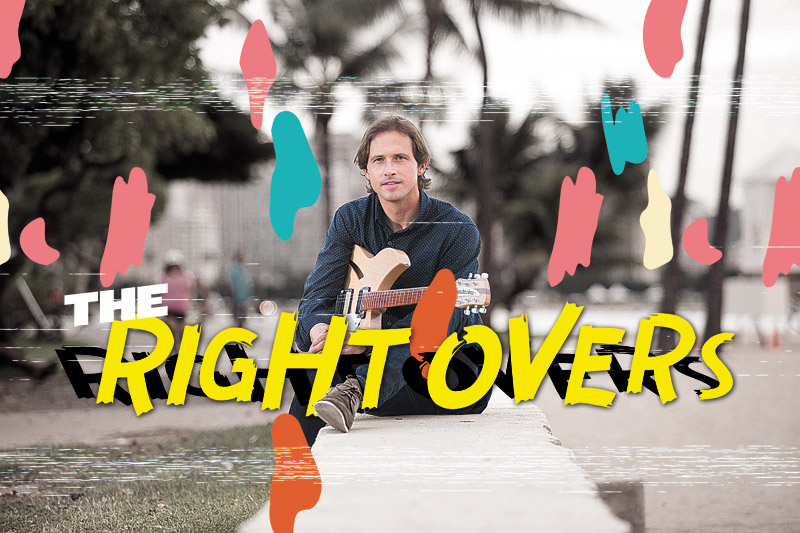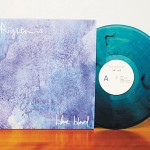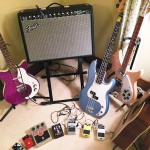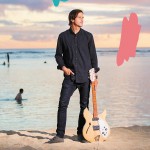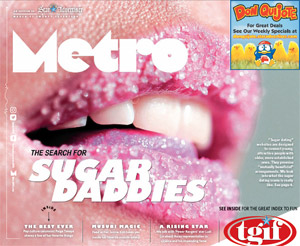The Rightovers
If Chris Holmes is any testimony, then artists of any kind crashing in their parents’ basements get a bad rap. After all, for Holmes, his summer stint in between grad school semesters living in the bottom-floor bedroom of his parents’ house in Idaho turned out to be one of the most musically productive he’s had.
“It was just the freedom to be able to wake up and have your amp and your recording stuff two feet away and make as much noise as you want,” recalls Holmes.
That “noise” resulted in Blue Blood, the first album by Holmes’ solo project The Rightovers. Filled with a collection of upbeat, melodic indie pop songs — with some offerings a little rockier, moodier — Blue Blood feels distinctly like a callback to the alt-rock bands of the 1990s. Holmes says that he has been heavily inspired by bands from that decade like Pavement, The Jesus and Mary Chain, and Sonic Youth.
Although he teams up with a band to play live, what you hear on Blue Blood is largely Holmes himself, with the exception of drums by Mike Kamoo and back-up vocals by Sarah O’Brien.
After recording and returning to Hawaii, things happened the way things tend to: all at once. Holmes released the album, then took to the road, traveling to Portland, Seattle and Boise to get Blue Blood stocked into several record shops. Then Blue Blood was picked up by Seattle-based indie pop label Jigsaw Records and pressed to vinyl. Then came the flurry of performances last summer and fall — shows at Downbeat Lounge, ARTafterDARK and other local venues.
- For more on The Rightovers and to listen to blue blood, visit therightovers.Bandcamp.Com.
- Chris Holmes’ recording setup at his parents’ house in Idaho PHOTO COURTESY CHRIS HOLMES
- If The Rightovers’ sound is 90s, then the process of putting it together is distinctly more modern
This past year certainly has been a big one for Holmes. In recent months, though, things have died down a bit, and The Rightovers currently are on something of a hiatus — in large part, Holmes says, because his live lineup fell apart due to contributors leaving the island or having other commitments.
But, he says, it has given him the opportunity to focus on writing new music.
“I’ve been taking the time to experiment at home and come up with a new set of songs,” he explains.
And when he emerges from this bout of songwriting, The Rightovers are poised to evolve into something different; he describes the stuff he’s been writing lately as having a more dissonant sound.
But let’s back up — or if we’re using 90s lexicon, rewind.
It was in high school in Connecticut in the 1990s that Holmes first got into music, discovering popular bands of the time like Pavement and Sonic Youth, while also listening to older classics like Talking Heads and The Velvet Underground. And he started collecting records — a hobby that he maintains today, although he admits that his collection is “modest by most record nerd standards.” (He did have to leave a lot of his collection behind when he moved here, but he made sure to snag all of his favorites: Wowee Zowee by Pavement, Alien Lanes by Guided by Voices, Up on the Sun by Meat Puppets, Quebec by Ween.)
Later, in college, his love of music inspired him to pick up the guitar and start playing himself — he initially was just trying to mimic simple riffs from bands he was into.
After college, he spent a decade in California, moving first to San Francisco, then Los Angeles and San Diego, forming bands along the way. His San Diego power pop band, Conceptus, was successful enough to earn regular gigs at venues throughout the city. But Holmes recalls it often was tough going. And while he admits it was disheartening that the band didn’t achieve larger recognition, he kept at it, he says, because “I just felt like I still had good songs in me.”
He moved to Oahu from San Diego, initially to attend a graduate communications program at Hawaii Pacific University. (Plus, as an avid surfer, Holmes admits that the water also was one of the reasons he was drawn to the school in the first place.) Since graduating, he did a stint at a local public relations firm, and now is a technical writer for a healthcare company and does freelance copywriting and editing.
Musically, working solo through The Rightovers, Holmes seemingly hit a new stride. During his time in Conceptus, he had been jotting down ideas for songs on the side, the bones of what eventually became Blue Blood.
“Most of them were really just sketches at that point, stuff we might have tried to jam on once or twice in Conceptus,” he explains. “When I moved to Hawaii, I was able to refocus on them and bring them to fruition.”
If The Rightovers’ sound is 90s, then the process of putting it together is distinctly more modern.
As largely a one-man show while recording, Holmes plays each of the song’s two-to-three guitars, then the bass, then does vocals — all individually on his own before meshing it together, blending in the best parts of each take. After he’s finished with that — at least the way it worked with Blue Blood — he’d send a song to his friend Mike Kamoo, who’d record drums before sending it back to Holmes for final edits.
Part of the reason Holmes prefers to do it this way, he says, is because of his somewhat exacting nature as a musician. “I usually have a very specific idea of what I want played, and I tend to work well that way,” Holmes explains. “It’s a step-by-step process, and I am a real perfectionist, so I tend to do a million takes of each instrument.
“I will have a guitar part in my head and I want to play it perfectly … That means I am going to go over and over and over until I have it perfectly,” he adds.
Any sort of hiatus that The Rightovers may be on now is really only merely publicly; privately, Holmes still is diligently plugging away on new material. And in particular, he recently has been experimenting with alternate tunings — something he’s always enjoyed but, as he says, he “never really had the balls, for lack of a better term, to really get into it.
“I felt like it was time to tear up the script and start anew, like I was learning to play guitar again,” Holmes explains.
The Rightovers’ sophomore effort is still in its early workings, but Holmes is hoping to release another album in 2016.
“I think Lee Renaldo from Sonic Youth put it well. He said, ‘When you’re playing in standard tuning all the time … things end up sounding standard.’
“Alternate (tunings) sound just a little bit different,” Holmes continues, “and as human beings, we are complicated, and I think some of the dissonant sounds capture that better.”

